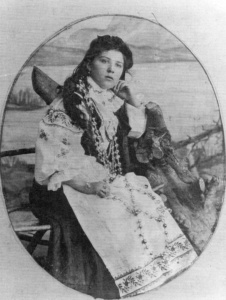
In the last half of 2016, Dr. Eric Schmaltz, professor of history at Northwestern Oklahoma State University and co-executive director of the endowed NWOSU Institute for Citizenship Studies, presented at a number of conferences from coast to coast.
Following discussions related to national minority policies in the former Soviet Union at international conferences held this past summer in Concord, California, and Rapid City, South Dakota, Schmaltz presented in mid-November at the Annual Convention of the Association for Slavic, East European, and Eurasian Studies (ASEEES) hosted in Washington, D.C. His paper titled “Letters to Pauline (Schlegel) Lehl: Family Correspondences from Russia to Oklahoma, 1913-1937” was invited as part of a special academic panel concerning early Soviet-era letter exchanges from Russia and the Soviet Union to North America.
PICTURED RIGHT: Volga German immigrant Pauline (Schlegel) Lehl (1893-1982) from Russia in 1913.
Schmaltz has been investigating a large corpus of 180 handwritten letters mailed between 1913 and 1937 from Russia’s Saratov Province in the Volga Region and elsewhere to rural Ingersoll and Alva.
“Though now virtually forgotten, Ingersoll, which was Volga German immigrant Pauline (Schlegel) Lehl’s initial place of residence, claimed a post office until 1942,” he explained. “Original envelopes stamped and delivered from Russia show that her relatives’ early letters arrived in Ingersoll, and later on in Alva after she was married to her husband, William.”
This large body of correspondences from family and friends spanned the period preceding the First World War’s outbreak to Soviet Communist dictator Joseph Stalin’s Great Terror. The preserved letters offer a glimpse into daily life during one of the most transformative and violent eras in modern world history. Sometimes through subversive writing techniques and coded language to avoid official censors, they related to the outside what was happening inside the old country.
PICTURED LEFT: An original envelope from December 1914 mailed from Russia to Ingersoll, Oklahoma.
Schmaltz noted that part of the family story is tied to the University of Kansas in Lawrence.
“Between 1988 and 1992, this branch of the Lehl family in Kansas was able to enlist the professional services of Dr. Eugenia Felton, a noted Russian linguist of Estonian background who had worked for many years at the university and who is now passed away,” he said. “In 1994, the family reproduced her handwritten translations on typewriter for a self-publication. Around this time, after the Cold War, the family had the good fortune through a Russian pen pal to reconnect with surviving relatives in the former Soviet Union. After both sides of the family reunited, most of the original letters were returned as a gift to family in Russia.”
In October 2013, immigrant Pauline (Schlegel) Lehl’s granddaughter, retired educator Ella Marie (Lehl) Frederick of Wichita, Kansas, generously donated to Schmaltz one of only two original typed sets of the entire letter collection for the expressed purpose of historical preservation. He has now completed a digital scan of all original typed and translated manuscripts, as well as the handful of remaining original documents such as envelopes and letters, for further editing as part of an anticipated published book compilation and related projects.
PICTURED RIGHT: Part of an original family letter in Russian written in May 1919.
“This collection represents one of my larger, long-term projects,” Schmaltz said. “It is an enormous honor and privilege to be involved with sharing to the public this incredible family treasure that still bears witness to major historical events nearly one century ago and that embodies the enduring power of the human spirit across space and time.”
During spring term and beyond, Schmaltz plans to present other talks on the Lehl letter collection, including at the Cherokee Strip Regional Heritage Center in Enid and the 2017 Annual Meeting of the Oklahoma Historical Society (OHS) held at the Cherokee Nation’s Hard Rock Hotel and Casino in Catoosa. He also hopes eventually to publish his findings as an article in the Society’s quarterly journal, “The Chronicles of Oklahoma.”
For more information on Schmaltz’s upcoming talks contact him at (580) 327-8526 or ejschmaltz@nwosu.edu.
